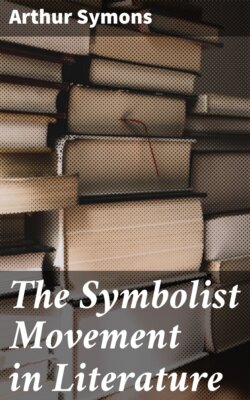Читать книгу The Symbolist Movement in Literature - Symons Arthur - Страница 8
На сайте Литреса книга снята с продажи.
4
ОглавлениеIn all that he writes of life, Balzac seeks the soul; but it is the soul as nervous fluid, the executive soul, not the contemplative soul, that, with rare exceptions, he seeks. He would surprise the motive force of life: that is his recherche de l'Absolu; he figures it to himself as almost a substance, and he is the alchemist on its track. "Can man by thinking find out God?" Or life, he would have added; and he would have answered the question with at least a Perhaps.
And of this visionary, this abstract thinker, it must be said that his thought translates itself always into terms of life. Pose before him a purely mental problem, and he will resolve it by a scene in which the problem literally works itself out. It is the quality proper to the novelist, but no novelist ever employed this quality with such persistent activity, and at the same time subordinated faction so constantly to the idea. With him action has always a mental basis, is never suffered to intrude for its own sake. He prefers that an episode should seem in itself tedious rather than it should have an illogical interest.
It may be, for he is a Frenchman, that his episodes are sometimes too logical. There are moments when he becomes unreal because he wishes to be too systematic, that is, to be real by measure. He would never have understood the method of Tolstoi, a very stealthy method of surprising life. To Tolstoi life is always the cunning enemy whom one must lull asleep, or noose by an unexpected lasso. He brings in little detail after little detail, seeming to insist on the insignificance of each, in order that it may pass almost unobserved, and be realised only after it has passed. It is his way of disarming the suspiciousness of life.
But Balzac will make no circuit, aims at an open and an unconditional triumph over nature. Thus, when he triumphs, he triumphs signally; and action, in his books, is perpetually crystallising into some phrase, like the single lines of Dante, or some brief scene, in which a whole entanglement comes sharply and suddenly to a luminous point. I will give no instance, for I should have to quote from every volume. I wish rather to remind myself that there are times when the last fine shade of a situation seems to have escaped. Even then, the failure is often more apparent than real, a slight bungling in the machinery of illusion. Look through the phrase, and you will find the truth there, perfectly explicit on the other side of it.
For it cannot be denied, Balzac's style, as style, is imperfect. It has life, and it has an idea, and it has variety; there are moments when it attains a rare and perfectly individual beauty; as when, in Le Cousin Pons, we read of "cette prédisposition aux recherches qui fait faire à un savant germanique cent lieues dans ses guêtres pour trouver une vérité qui le regard en riant, assise à la marge du puits, sous le jasmin de la cour." But I am far less sure that a student of Balzac would recognise him in this sentence than that he would recognise the writer of this other: "Des larmes de pudeur, qui roulèrent entre les beaux cils de Madame Hulot, arrêtèrent net le garde national." It is in such passages that the failure in style is equivalent to a failure in psychology. That his style should lack symmetry, subordination, the formal virtues of form, is, in my eyes, a less serious fault. I have often considered whether, in the novel, perfect form is a good, or even a possible thing, if the novel is to be what Balzac made it, history added to poetry. A novelist with style will not look at life with an entirely naked vision. He sees through coloured glasses. Human life and human manners are too various, too moving, to be brought into the fixity of a quite formal order. There will come a moment, constantly, when style must suffer, or the closeness and clearness of narration must be sacrificed, some minute exception of action or psychology must lose its natural place, or its full emphasis. Balzac, with his rapid and accumulating mind, without the patience oft selection, and without the desire to select where selection means leaving out something good in itself, if not good in its place, never hesitates, and his parenthesis comes in. And often it is into these parentheses that he puts the profoundest part of his thought.
Yet, ready as Balzac is to neglect the story for the philosophy, whenever it seems to him necessary to do so, he would never have admitted that a form of the novel is possible in which the story shall be no more than an excuse for the philosophy. That was because he was a great creator, and not merely a philosophical thinker; because he dealt in flesh and blood, and knew that the passions in action can teach more to the philosopher, and can justify the artist more fully, than all the unacting intellect in the world. He knew that though life without thought was no more than the portion of a dog, yet thoughtful life was more than lifeless thought, and the dramatist more than the commentator. And I cannot help feeling assured that the latest novelists without a story, whatever other merits they certainly have, are lacking in the power to create characters, to express a philosophy in action; and that the form which they have found, however valuable it may be, is the result of this failure, and not either a great refusal or a new vision.
